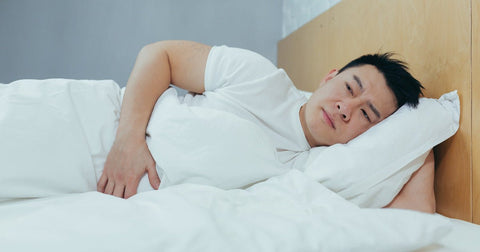Both weight gain and hair loss are common concerns that affect millions of people. These issues can have a significant impact on one's physical appearance, self-esteem, and overall health. Understanding the potential connection between weight gain and hair loss is crucial, as it can help in identifying underlying causes and finding effective solutions.

This article looks into the complex relationship between these two conditions, examining the possible causes, the role of hormonal imbalances, dietary influences, and the impact of lifestyle factors. By delving into scientific evidence and offering practical advice, we aim to provide a comprehensive guide to managing both weight gain and hair loss.
Understanding Weight Gain
Weight gain is a common health concern that can result from a variety of factors. Understanding these factors is crucial for managing and preventing weight-related health issues.
- Diet and Nutrition: One of the most significant contributors to weight gain is an imbalance between calorie intake and expenditure. Consuming high-calorie, nutrient-poor foods, such as fast food, sugary drinks, and snacks, can lead to excessive calorie intake. Poor dietary choices often result in the accumulation of fat in the body, particularly when paired with low physical activity levels.
- Sedentary Lifestyle: Modern lifestyles often involve long hours of sitting, whether at a desk job, in front of the television, or using electronic devices. Physical inactivity reduces the number of calories burned and contributes to weight gain. Regular physical activity is essential for maintaining a healthy weight and overall well-being.
- Hormonal Imbalances: Hormones play a crucial role in regulating metabolism and body weight. Conditions such as hypothyroidism, where the thyroid gland produces insufficient hormones, can slow down metabolism and lead to weight gain. Similarly, polycystic ovary syndrome (PCOS) can cause hormonal disruptions that result in weight gain and difficulty losing weight.
- Medical Conditions: Certain medical conditions and medications can contribute to weight gain. For example, people with hypothyroidism may experience weight gain due to a slowed metabolic rate. Additionally, medications such as antidepressants, antipsychotics, and corticosteroids can cause weight gain as a side effect.
The impact of weight gain on overall health can be profound, increasing the risk of developing chronic conditions such as diabetes, cardiovascular diseases, and certain cancers. Therefore, addressing the root causes of weight gain is essential for maintaining a healthy lifestyle.
Understanding Hair Loss

Hair loss is a condition that affects many people, regardless of age or gender. It can have significant emotional and psychological impacts, making it important to understand its causes and types.
- Androgenetic Alopecia: Also known as male or female pattern baldness, androgenetic alopecia is the most common type of hair loss. It is characterized by a gradual thinning of hair, typically starting at the temples and crown in men and the top of the scalp in women. This condition is hereditary and influenced by hormones, particularly dihydrotestosterone (DHT).
- Telogen Effluvium: This type of hair loss occurs when a significant number of hair follicles enter the resting phase (telogen) simultaneously, leading to widespread shedding. Telogen effluvium can be triggered by various factors, including stress, illness, surgery, or changes in medication. It is usually temporary, with hair regrowth occurring once the underlying cause is addressed.
- Alopecia Areata: An autoimmune condition, alopecia areata causes patchy hair loss on the scalp, face, and other areas of the body. The immune system mistakenly attacks hair follicles, leading to hair loss. While the exact cause of alopecia areata is unknown, it is believed to involve genetic and environmental factors.
Common Causes of Hair Loss
- Genetics: A family history of hair loss increases the likelihood of experiencing androgenetic alopecia. Genetic predisposition plays a significant role in determining the onset and progression of hair loss.
- Hormonal Changes: Hormonal fluctuations, particularly during pregnancy, menopause, and thyroid disorders, can lead to hair loss. For instance, postpartum hair loss is common among women due to hormonal changes after childbirth.
- Stress and Lifestyle Factors: Chronic stress, poor diet, lack of sleep, and unhealthy lifestyle choices can contribute to hair loss. Stress triggers the release of hormones that can disrupt the hair growth cycle, leading to shedding and thinning.
- Nutritional Deficiencies: A lack of essential nutrients, such as iron, vitamin D, and protein, can weaken hair and cause it to fall out. Proper nutrition is vital for maintaining healthy hair growth and preventing hair loss.
The Connection Between Weight Gain and Hair Loss
Hormonal Links Between Weight Gain and Hair Loss

The interplay between hormones and body weight significantly impacts hair health. Insulin resistance, often associated with weight gain, can disrupt normal hair growth. Elevated insulin levels increase the production of androgens, hormones that can shrink hair follicles and shorten the hair growth cycle. This hormonal imbalance is a common factor in conditions like polycystic ovary syndrome (PCOS), which is characterized by both weight gain and hair loss.
Similarly, fluctuations in estrogen levels, which can occur with weight gain, affect hair density and growth. Estrogen promotes hair growth by prolonging the anagen (growth) phase of the hair cycle. When estrogen levels drop, the hair can enter the telogen (resting) phase prematurely, leading to increased shedding.
Impact of Diet and Nutrition on Both Weight and Hair Health
Diet plays a crucial role in both maintaining a healthy weight and promoting hair health. Nutrient deficiencies are a common link between weight gain and hair loss. For example, iron deficiency, which can result from poor dietary habits, is a well-known cause of hair thinning and loss. Iron is vital for producing hemoglobin, which carries oxygen to hair follicles, promoting healthy hair growth.
Similarly, a diet lacking in essential vitamins and minerals, such as vitamin D, zinc, and biotin, can compromise hair health. These nutrients are necessary for maintaining the hair's structural integrity and supporting the hair growth cycle. A diet high in processed foods and sugars can contribute to weight gain and exacerbate nutrient deficiencies, further impacting hair health.
Inflammatory Processes and Their Effects on Hair Follicles
Chronic inflammation, often linked with obesity, can negatively affect hair follicles. Inflammatory cytokines, which are elevated in people with excess body weight, can disrupt the normal functioning of hair follicles, leading to conditions like telogen effluvium, where hair prematurely enters the resting phase and sheds excessively.
Psychological Stress as a Common Factor in Both Conditions

Psychological stress is another crucial factor that can link weight gain and hair loss. Stress triggers the release of cortisol, a hormone that can disrupt various bodily functions, including metabolism and hair growth. Chronic stress can lead to weight gain by promoting unhealthy eating habits and reducing the body's ability to metabolize fat efficiently. At the same time, high cortisol levels can push hair follicles into the telogen phase, resulting in increased hair shedding.
Preventive Measures and Solutions
Balanced Diet Rich in Essential Nutrients
Incorporate a variety of nutrient-dense foods such as fruits, vegetables, whole grains, lean proteins, and healthy fats. Essential nutrients like iron, vitamin D, zinc, and omega-3 fatty acids play a crucial role in maintaining hair health and preventing weight gain.
Focus on foods high in antioxidants, which can help reduce inflammation and oxidative stress that may contribute to both weight gain and hair loss. Stay hydrated by drinking plenty of water throughout the day. Proper hydration supports overall health and can improve the condition of your hair.
Regular Physical Activity
Engage in regular exercise, which is vital for maintaining a healthy weight and promoting circulation, including to the scalp. Aim for at least 150 minutes of moderate-intensity aerobic activity or 75 minutes of vigorous-intensity activity each week.
Include strength training exercises at least twice a week to build muscle mass, which can help boost metabolism and support weight management.
Stress Management Techniques

Practice stress-reducing activities such as yoga, meditation, deep-breathing exercises, or hobbies that you enjoy. Chronic stress can negatively impact both weight and hair health by disrupting hormonal balance.
Ensure you get enough sleep each night. Quality sleep is essential for overall well-being and can help manage stress levels.
Medical Treatments and Interventions
Hormonal Therapies
If hormonal imbalances are contributing to weight gain and hair loss, consult a healthcare provider about possible treatments. Hormone replacement therapy or medications that regulate hormone levels may be beneficial.
Polycystic ovary syndrome (PCOS) and thyroid disorders are common conditions that affect both weight and hair. Treatment for these conditions can help address the underlying issues.
Medications and Supplements
Consider medications that promote hair growth, such as minoxidil or finasteride, under the guidance of a healthcare professional.
Supplements that support hair health, such as biotin, vitamin D, and iron, can be helpful if you have deficiencies. Always consult a healthcare provider before starting any new supplement regimen.
Dermatological Treatments for Hair Loss
Procedures like platelet-rich plasma (PRP) therapy, microneedling, and low-level laser therapy can stimulate hair growth and improve hair density.
In severe cases, hair transplant surgery may be an option to restore hair in areas of significant loss.
When to Seek Professional Help

- Persistent or Severe Hair Loss
If you notice excessive hair shedding, thinning, or bald patches that do not improve with over-the-counter treatments or lifestyle changes, it is important to seek professional help. Sudden or unexplained hair loss can be a sign of an underlying medical condition that requires attention.
- Significant, Unexplained Weight Gain
If you experience rapid or unexplained weight gain that does not respond to dietary and lifestyle adjustments, consult a healthcare provider to rule out potential medical causes. Weight gain accompanied by symptoms such as fatigue, changes in skin or hair texture, or menstrual irregularities may indicate a hormonal imbalance or metabolic disorder.
Whom to Consult
- Dermatologists
Dermatologists specialize in skin, hair, and nail conditions. They can diagnose the cause of hair loss and recommend appropriate treatments, including medical and procedural options.
- Endocrinologists
Endocrinologists focus on hormonal and metabolic disorders. They can evaluate and treat conditions like thyroid disorders, PCOS, and other hormonal imbalances that may be contributing to weight gain and hair loss.
- Nutritionists
Nutritionists can provide personalized dietary advice to address nutrient deficiencies and support overall health. They can help design a balanced diet that promotes weight management and hair health.
The Connection Between Weight Gain and Hair Loss
Can weight gain cause hair loss?
Yes, weight gain can be associated with hair loss due to hormonal imbalances, poor nutrition, and increased stress levels. Conditions like insulin resistance and elevated androgen levels, which are often linked to weight gain, can negatively impact hair health.
How do hormonal imbalances affect both weight and hair?
Hormonal imbalances, such as those seen in thyroid disorders or polycystic ovary syndrome (PCOS), can lead to both weight gain and hair loss. These imbalances can disrupt normal hair growth cycles and affect metabolism, contributing to weight changes.
Can improving my diet help with hair loss and weight management?

Absolutely. A balanced diet rich in essential nutrients like iron, vitamin D, zinc, and omega-3 fatty acids can support hair health and help manage weight. Ensuring you get enough protein and antioxidants also promotes overall well-being.
What lifestyle changes can I make to address weight gain and hair loss?
Adopting a healthy lifestyle that includes regular exercise, a balanced diet, adequate hydration, and stress management can positively impact both weight and hair health. Activities like yoga and meditation can help reduce stress, which is a common factor in both conditions.
When should I see a doctor about my weight gain and hair loss?
If you experience persistent or severe hair loss or significant, unexplained weight gain that does not improve with lifestyle changes, it's important to seek professional help. Consulting with dermatologists, endocrinologists, or nutritionists can help identify underlying causes and develop effective treatment plans.
Conclusion
The connection between weight gain and hair loss is multifaceted, involving hormonal imbalances, nutritional deficiencies, and lifestyle factors. Addressing these issues requires a holistic approach that includes maintaining a balanced diet, engaging in regular physical activity, and managing stress effectively. Medical treatments and professional guidance can also play a vital role in managing these conditions.
By understanding the underlying causes and taking proactive measures, people can improve their overall health and well-being. If you are experiencing persistent or severe symptoms, don't hesitate to seek professional advice from dermatologists, endocrinologists, or nutritionists. Taking early action can make a significant difference in effectively managing weight gain and hair loss.


.png?v=1737390083)
.png?v=1737187409)


